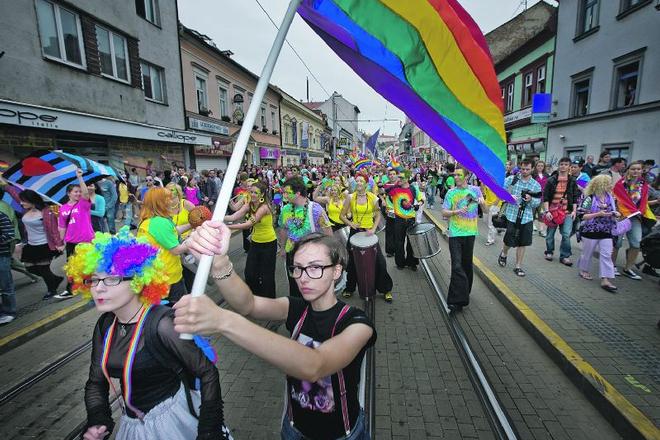LGBTI people living in Slovakia have recently been given reason to hope that their status in society might begin to approach the liberal-democratic standards of other European countries. For the first time in the country’s history they will have a unique body in the government to represent them and their rights. Reactions to the newly established committee, however, highlight the division in Slovak society over the rights of lesbian, gay, bisexual, transgender, and intersex (LGBTI) persons.
At its October 3 session, the cabinet of Robert Fico gave the green light to the creation of a committee for the rights of LGBTI people, which will function within the government’s advisory body, the Council for Human Rights, National Minorities, and Gender Equality.
“This is a sensitive topic that polarises society,” conceded Foreign Minister Miroslav Lajčák, who is responsible for the human rights agenda in the government and is president of the council, as quoted by the SITA newswire, adding that one should not hide one’s head in the sand when facing sensitive topics.
The cabinet decided the committee would be chaired by Justice Minister Tomáš Borec. Lajčák said he is hoping the committee will serve as a platform for discussing LGBTI rights and issues in a distinguished and professional manner, SITA reported.
Long road to the committee
The step came after heavy criticism from LGBTI rights organisations and activists of the previous cabinet, led by Iveta Radičová, when it refused to create a committee to focus on LGBTI rights, and continued with Robert Fico, who, shortly after coming to power, cancelled the post of the deputy prime minister for national minorities and human rights, under whose auspices the council was working.
Under the current government Foreign Minister Miroslav Lajčák became the new chair of the council, informally known as the human rights council, on June 20, when the council’s statute was changed.
The council was created by the cabinet of Iveta Radičová in March 2011 after it dissolved the separate councils for national minorities and ethnic groups, NGOs, seniors, disabled people and gender equality, as well as the committee of ministers for children, and replaced them with the newly-established Council for Human Rights, National Minorities and Gender Equality to advise the deputy prime minister for national minorities, a post then held by Rudolf Chmel from Most-Híd.
In May 2011 the new council proposed that seven committees be created under its auspices, based on the grounds for discrimination as defined by Slovakia’s Anti-Discrimination Act, among them a committee to monitor the rights of LGBTI citizens. The cabinet agreed to establish six committees but balked at the idea of one for LGBTI rights, when ministers from the Christian Democratic Movement (KDH) refused to approve it.
LGBTI rights organisations at the time accused the government of homophobia, while the KDH called the committee redundant, arguing that the human rights issues of all citizens were already being dealt with by the council.
Critical voices raised
The now-opposition KDH was among those who protested the creation of the LGBTI committee, with MP Marián Kvasnička suggesting that Fico’s cabinet’s step was “populism on the verge of ethical hazard”.
“We do not support the expressions of positive discrimination, one of which we also believe to be the creation of the committee for the rights of LGBTI persons,” Marián Kvasnička wrote in an official statement.
The Catholic Conference of Bishops of Slovakia (KBS) was “disappointed” with the creation of the committee as well.
“This step has launched the promotion of a hard anti-family ideological agenda,” KBS spokesperson Jozef Kováčik told The Slovak Spectator.
The Fórum Života (Life Forum) civic association in turn accused the government of being hypocritical, saying that on one hand the government pledged to protect and promote marriage as a unique bond between a man and a woman, but then did not hesitate to create a “committee for homosexuals”.
Meanwhile, LGBTI rights and pro-choice organisations welcomed the committee as a sign that the cabinet is willing to open discussion and “seek solutions to the lack of observance of the human rights of LGBTI persons and discrimination based on sexual orientation and gender identity”, they wrote in an official statement.
“We appreciate the constructive approach of the new president of the Council, Deputy Prime Minister Miroslav Lajčák, and his team in the process of preparation of the committee and its passage by the cabinet,” said Martin Macko from the Inakosť (Otherness) civic initiative. “We presume that a similar atmosphere will rule the working sessions of the committee, and mainly that the cabinet will continue to show good will and courage in fulfilling the recommendations of the committee and the council.”
Lajčák, the council’s president, was, however, quick to note that the committee does not have the right to propose legislation, SITA reported. He denied that the creation of the committee would automatically result in the passage of any new break-through laws.



 The Rainbow Pride 2015 parade in Bratislava. (source: SME)
The Rainbow Pride 2015 parade in Bratislava. (source: SME)